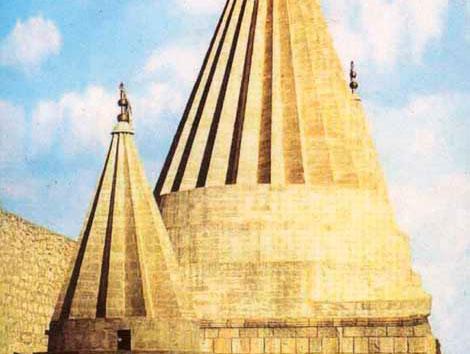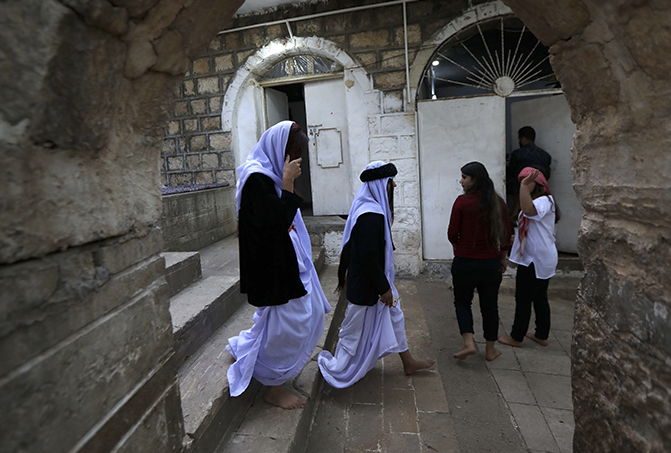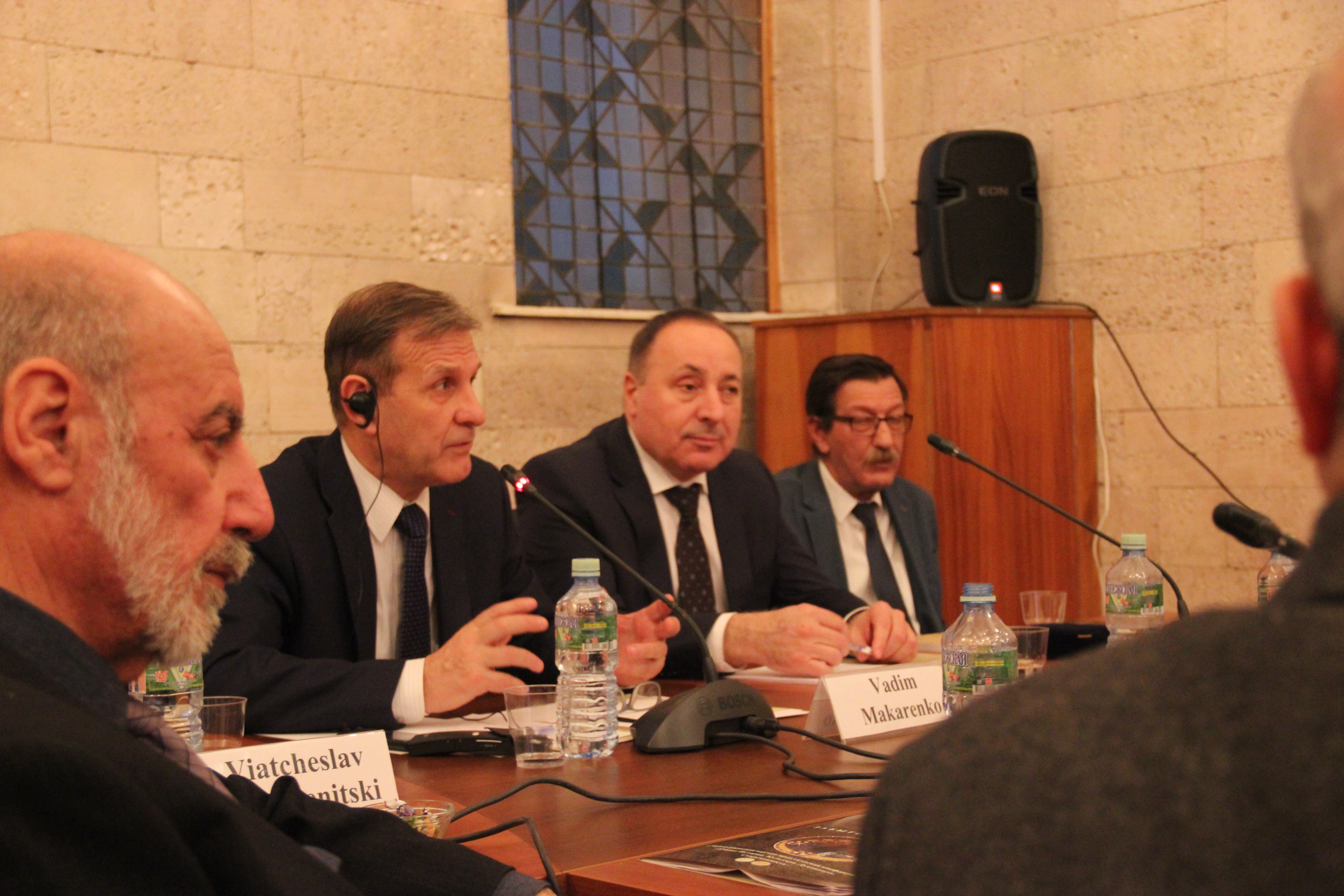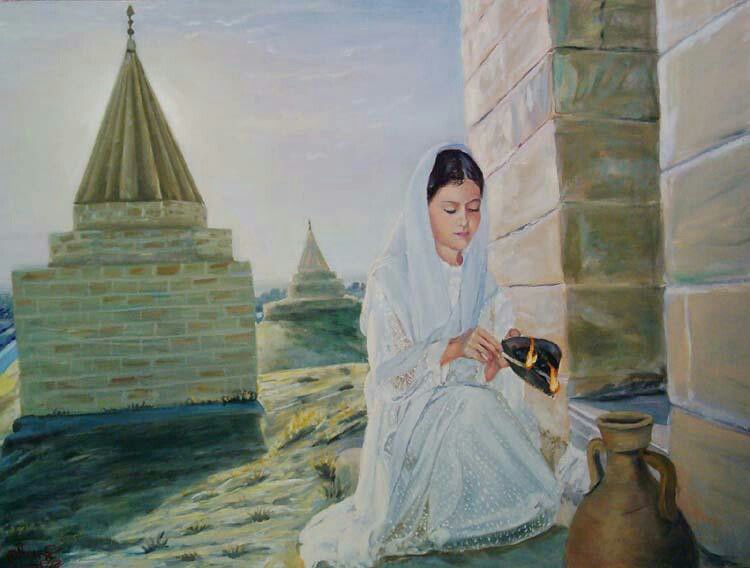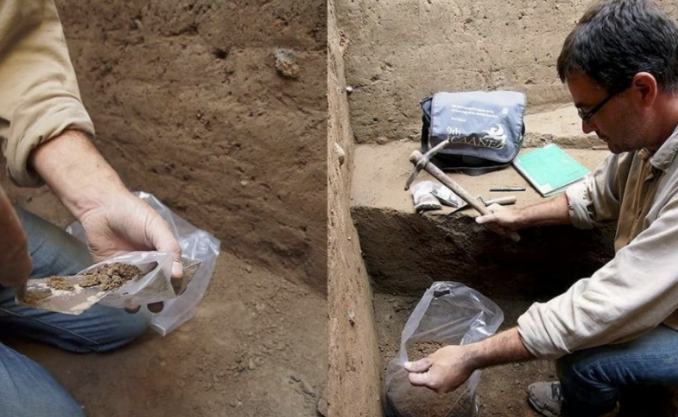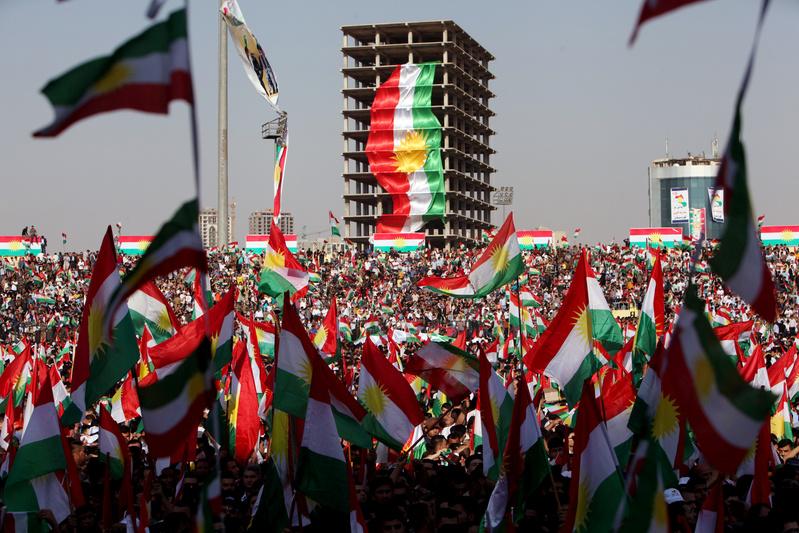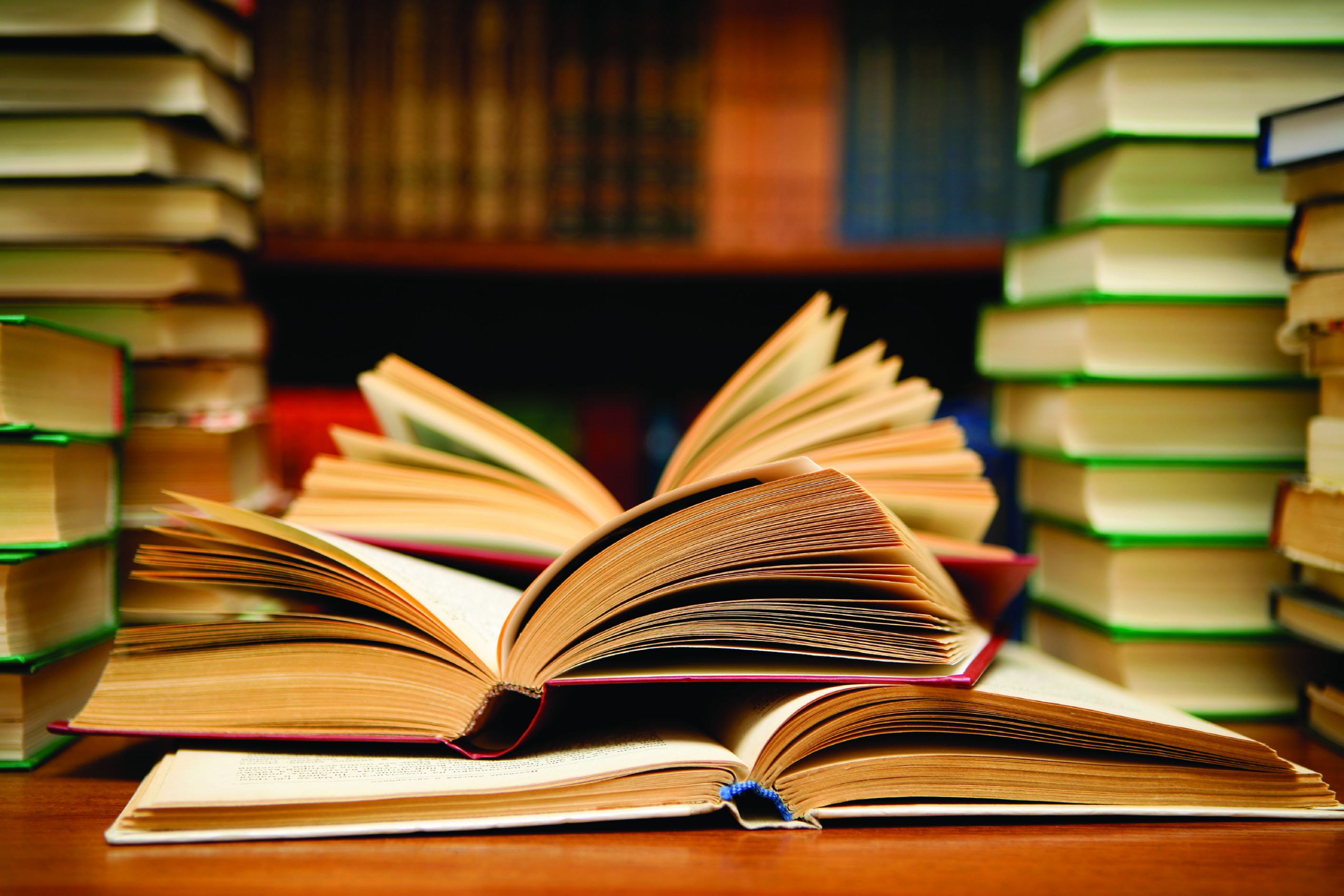Articles
Kurdistan: Where Poets Are More Than Poets
Alana Marie Levinson-Labrosse / 7 ноября 2017 года
Poets are setting people free, liberating thought through language.
The auditorium fills. A janitor weaves through the crowd to unlock the upper balcony, and soon that fills, too. Men sit on each other’s knees, three to a seat, careful not to touch the women around them. Men fill the center aisle, flowing around the five video cameras that will broadcast the event to several television channels. Groups of women sit on the floor, leaning against the bolted-down chairs. Photographers clog the stairs to the stage. When the poet enters the room, those not already on their feet spring out of their seats, applauding.
The poet, in a collared shirt beneath a sweater vest and elbow-patched blazer, takes his seat. The more audacious fans push to shake his hand; he rises to accept, to graze cheeks in the formal kiss. Each time he stands, the audience follows, breaking into fresh, ferocious applause. He takes the stage flanked by three bodyguards who clear a path through the grabbing attendees.
During his short speech on political parties and their failings, the Kurdish language and its splintering, the audience keeps bursting into applause, like peals of thunder. I start a tally as he reads his poems. Audience members mouth the words along with him. After one poem, the clapping synchronizes and the audience takes up a chant, “Doo-bah-rah! Doo-bah-rah!” — “Again! Again!” and the poet relaunches, delivering the poem a second time. He leans over the lectern to deliver the lines. The tally: 48.
Backbeat
I remember the first time I’d seen such a response to live poetry — at an elocution contest sponsored by the American University of Iraq, Sulaimani (AUIS). Some 20 contestants took the stage and at least 100 students crammed into the cafeteria just to watch try-outs. At the time, the school only had 400 students. When the student-translator took the stage to read the poem in its original language first, the audience interrupted him, cheering at the end of each line. All this while the university had trouble galvanizing students to come to soccer games. The audience heard the same poem 20 times and never seemed to tire of it, developing a steady beat to their clapping which, during the longer transitions between contestants, they used as the backbeat for spontaneous line dancing in between the seats.
It was a delight to watch, and yet I wondered why these students responded so fervently to poetry.
Only in 2003 did Kurdish become the state language for the semi-autonomous Kurdish region in Iraq. Until then, Iraqi Kurds were forced to fluency in Arabic. The Turkish government banned the use of the Kurdish language for a hundred years.
Back in the auditorium, the joy had an odor, intensified by the struggling air conditioning: cologne, dust and sweat. All these people pulled together so tightly in anticipation of rhyme, meter and reflection. Why such devotion to these poets? To their poems? I asked a few Kurdish poets to reflect on this question.
The Two Worlds’ Effect
In his poem, “Two Worlds,” Hemin Latif asks: “Don’t you see how I’m divided? / Don’t you see how I am two parts? / Don’t you know these two worlds?” His readers might imagine that these two parts, these two worlds are the corporeal and ethereal or perhaps the western and eastern. As an emerging poet and the former chair of the IT Department at AUIS, however, Latif means to indicate the worlds of poetry and information technology. Though he is an extreme example, with his two worlds as unrelated as they are, he is not unique in the pantheon of contemporary Kurdish poets.
While American poetry has become professionalized through the academy, Kurdish poetry remains, in Latif’s words, “a hobby, secondary.” So, Kurdish poets remain intimately connected to worlds other than poetry. Sherko Bekas, after he retired as a peshmerga — a Kurdish freedom fighter — ran Sardam, a publishing house in Sulaimani. Jamal Ghambar, renowned for his beautiful readings, practices law and just this fall ran for political office. Sherzad Hassan, a poet and translator, works as a media specialist for the Directory of Education in Sulaimani. Latif now serves as the acting provost at AUIS and will eventually transition into his role as the vice president for University Advancement.
In our conversation, Abdulla Pashew, one of the most famous living Kurdish poets, remarked: “I think you know, or have heard, about the Russian poet, Yevtushenko. He said, ‘In Russia the poet is more than a poet!’ Sometimes it seems to me that he said these words about Kurdish poets.” Referencing a particularly political poem he wrote, “12 Lessons for Children,” he says: “Could I write such a poem if I had been born or grew up in Paris or Stockholm? There, the papers, broadcast television and radio, the PMs, they say such things: not poets. Yes,” he adds for emphasis, “in Kurdistanpoets are more than poets!”
Dana Gioia starts his essay, “Can Poetry Matter,” arguing: “American poetry now belongs to a subculture. No longer part of the mainstream of artistic and intellectual life, it has become the specialized occupation of a relatively small and isolated group. Little of the frenetic activity it generates ever reaches outside that closed group.” This is the academic poetic environment in which I grew up. Even my favorite poets, writers I considered famous, receive not even name recognition in broader circles. Is it possible that in Iraqi Kurdistan I have witnessed what poetry can mean before it confines itself to the academy? Is banishment behind academic walls the inevitable fate of poetry, or does Kurdistan show us another path?
Perhaps contemporary Kurdish poetry demonstrates the inverse of Gioia’s theory. These Kurdish poets are part of the larger world around them, so the world responds to them. Or these poets engage in professions other than poetry, so they write on topics and in styles that achieve greater relevance to their audiences.
“He Says What We Cannot Say”
At one point, as I translated the controversial poet, Sheikh Raza Talabani, with a young Kurdish woman, she sat back and paused. “I see why he’s so important now,” she said. “He says what we cannot say.” In a society where certain things simply aren’t said, or can even be dangerous to say, poets become voices for all that individuals keep silent.
Pashew is known for being critical of Kurdish society, ungoverned by the political parties. In 1972, he read “12 Lessons for Children” in Kirkuk. A poem against the forced Arabization of Kurdish regions, it was “a forbidden poem,” only published in Kurdistan in 1991. He had been warned not to read it. Pashew remembers the event well: “During and after the reading, it was unbelievable! [The poem] was a demonstration under that bloody regime. I don’t know whether it was a good poem or not, but I know that I said what was forbidden to whisper, even to friends.”
The Kurds are divided across five politically sovereign nations. They have survived many military conflicts in the past century alone. It wouldn’t be surprising that Kurds would cherish recitation as a reliable method of cultural transmission.
When I asked if the connection between politics and poetry was a more recent trend, Homer Dizeyee, a famous lyricist, singer and political advisor to former President Jalal Talabani, responded: “The 400-year-old epic Mem u Zin is not only a love story. There is patriotic motive behind it. Consider the nationalistic poems of Haji Qadiri Koye; a few verses of Mustafa Pasha Yamulki; Ahmed Mukhtar Jaff,” and so many more.
In a more recent poem, “Viagra,” Pashew remains concerned with the silence surrounding corruption and betrayal in politics, but uses a lighter tone. He writes:
“There’s no need to advertise it
The whole world knows the blue eyes of Viagra,
The service it does for the right and the left,
But it strikes me
That our parliamentarians, when they eat it,
Get weak
Go silent.
Even swallowing 1000 pills
Won’t help.
Only their hands and their pockets can get erect!”
He speaks what others consider unspeakable. Even Sherko Bekas, author of the poem that would become the anthem for the Patriotic Union of Kurdistan (PUK), evolved into a man who implicitly turned away from politics. One of his final books bore the title, Now a Girl is My Homeland. Bekas moved his attention from “Garmyan’s Hurricane” to a “cloudy girl”:
“Instead of the river
I sit beside the rim of her body
Instead of on moss and beside the waterfall
I sit under her lovelocks.”
To a Western audience, this love-language is innocuous. Yet most readers of this poetry may not have, as Latif said, “free, open relationships and interactions with the opposite sex.” He adds: “Love poems are always welcome. People find they meet their thirst for thinking, interacting, and relating to the opposite sex.” It is as controversial to speak of love, especially anatomically explicit love, as to be politically critical.
A young woman, translating Kajal Ahmad, a female poet known for her fierce, sensual, poems, worried that simply bringing Ahmad into English might damage her reputation. With poems like “Nietzsche,” her fear doesn’t surprise me. Nietzsche said:
“Women are cats
And if they breed they become cows!”
If fate had put me
Before that mad man
I would have told him, […]
Give me one night
But let there be a conscious sun
Not a drowsing, dull moon,
Until I give you truth like a kiss and
Turn from the philosopher to philosophy.”
Dizeyee, famous for his more explicit romantic lyrics, is adamant: “I am a politician, artist, and lyricist. Critics see sensual inclination in my lyrics; I am fond of beauty, beauty in all its senses; I roam in a realm of aesthetics when I write.” But this realm of aesthetics, in the daily life of the young people I have known, is circumscribed. It is poets who set people free; through language, they liberate thought.
Present and Past Entertainments
From Latif’s perspective, until recent developments, including the Iraq War and a rise of investors in the KRG, there have not been public entertainments aside from concerts and poetry readings. Readings retain popularity because there have historically not been many other options. “In Western countries, such as the United States,” Latif said, “people have a plethora of options when they need a break. Options in this country are limited. Anything that promises difference is worth it.” Sulaimani, for example, a city of a million people and several major universities, didn’t have a movie theater until 2009.
The history of the Kurdish people, Dizeyee counters, has as much bearing on poetry’s popularity as the present: “Oral literature flourishes” in “nomadic societies”; “in rural areas, this became a deeply rooted culture, which has gone on and on until our day.” Additionally, Kurds have undergone significant political persecution that would force literature to remain oral and performance-oriented. Saddam Hussein used the Kurdish population as the national scapegoat, perpetrating acts of genocide.
Only in 2003 did Kurdish become the state language for the semi-autonomous Kurdish region in Iraq. Until then, IraqiKurds were forced to fluency in Arabic. The Turkish government banned the use of the Kurdish language for a hundred years. Though this ban was recently lifted, the legacy of an outlawed language remains in the oral transmission of literature.
The Kurds are divided across five politically sovereign nations. They have survived many military conflicts in the past century alone. It wouldn’t be surprising that Kurds would cherish recitation as a reliable method of cultural transmission.
National Identity
One way to conceive of the Kurdish identity revolves around negatives: past atrocities and persecutions, recent civil wars, current political fissures. Often the reference points for Kurdish identity in Iraq are Halabja and Kirkuk. But how can the Kurdish identity be something to celebrate that is neither tragic nor inherently politicized?
Even a poem about Halabja, the city that Saddam chemically bombed in 1988, is an act of creation. However small that creation, it stands in the face of that destruction. The poem is not contested territory. Even if it discusses controversial ideas or contradicts itself, it belongs to each reader equally. Each poem that articulates ideas through beautifully crafted Kurdish is an intimate celebration of that identity. “The nation” is not a political entity for Kurds at this moment. Poetry might offer Kurds an affirmative way to participate in their nationhood.
In our interview, Pashew mused: “Poetry is, first of all, the sound of nature and instinct. Material prospect and technological progress lead to rationality, which blunts instinct. Grown-up nations need poetry less than others.” It’s possible that in a “grown-up nation” like America, the reason a writer or a reader turns to poetry has changed. Perhaps the writer and the reader aren’t looking to tap into a larger ethnic identity, but to reach singularity.
Источник: fairobserver.com

